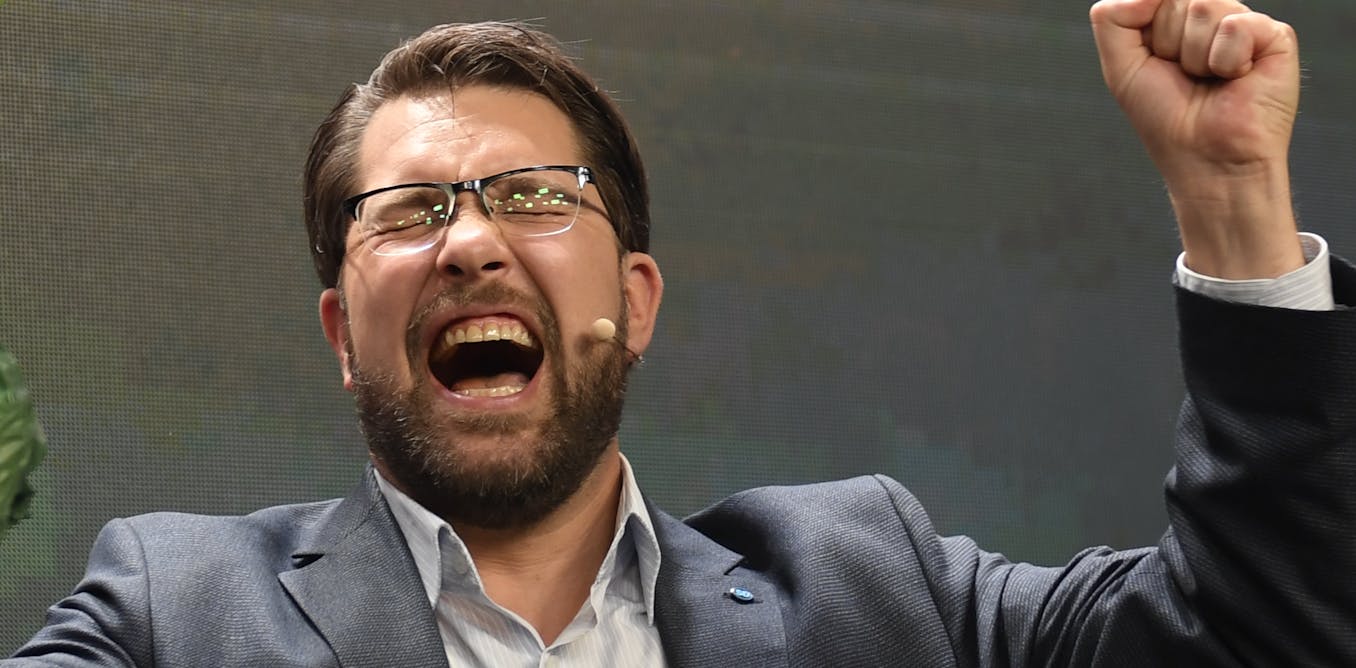
Anamaria Dutceac Segesten, Lund University
The nationalist, anti-immigration Sweden Democrats are the major gainers of the 2022 Swedish national elections.
Votes are still being counted but preliminary results show the party has gained 3.1%. This makes it the second largest party in Sweden, trailing only the the left-wing Social Democrats (albeit only by about 1.5% of the vote). And while the Social Democrats may be the largest individual party, the broader results currently make a right-wing coalition a more likely prospect.
Importantly, the Sweden Democrats have become the largest party of the right, which will leave other, more established parties on that side of the political spectrum in a difficult position when negotiations over forming a government begin.
The coalition game
In Sweden, the parties stand individual candidates but, knowing that coalitions are the norm, they generally make pre-electoral alliances. Smaller parties inform the voters of their post-election plans during the campaign, including which other parties they see as their potential governing partners. They also make it clear which parties they would not consider acceptable partners.
Sweden Democrats have historically been left out of such alliances. That, however, may have to change.
Since the 1970s, Sweden has been ruled by minority governments (with a few notable exceptions, such as during 2006-2010). The coalition in power needs the support of other parties in the parliament to pass through legislation, in exchange for concessions on core issues to these parties.
When looking at the election results, the most important element is the viability of the coalition and the willingness of non-coalition members to support the new cabinet when laws are passed in the parliament.
A place for the nationalist right in government?
With votes still being tallied, the race between the conservative alliance Moderaterna and the centre-left alliance Social Democrats is incredibly tight. There are fewer than 50,000 votes between them. It does, however, look likely that the right-wing coalition will secure the majority of seats in the Riksdag (parliament) once postal votes and votes coming in from Swedish nationals living abroad have been counted.
The question, now, is whether the Moderaterna bloc will create a minority government excluding the Sweden Democrats (as they implied they would during the campaign) or whether they will be forced by the results of the popular vote to award the right-wingers a ministerial post. If they do, they risk losing the support of the Liberal party, which agreed to join a governing coalition only if the Sweden Democrats remain outside the cabinet.
Moderaterna is under extra pressure here since it performed less well in 2022 than it did in the election held in 2018 and has been overtaken by the Sweden Democrats. In fact, all the parties belonging to the conservative alliance have lost votes since 2018. The Social Democrats, meanwhile, performed better this year than in 2018, making them the only right-wing party to have made gains. This makes it all the harder to justify excluding them from a coalition.
It is too early to call these elections, as negotiations will likely continue to weeks or even months. In 2018, it took until December to swear in a government and this year’s result may deliver similarly protracted negotiations.
What we do know is that the left-wing Social Democrats did not receive clear support from Swedish voters. The recent prevalence of violent crime and gang activity were top concerns in this election, and Moderaterna has made law and order a core campaign issue for decades.
And even though the message has not been explicitly framed as such, many voters make an association between crime and the question of migrant integration. This, of course, has been encouraged by the Sweden Democrats, the very people who have come out on top in the vote.
Anamaria Dutceac Segesten, Senior Lecturer in European Studies, Lund University
This article is republished from The Conversation under a Creative Commons license. Read the original article.
Support us and become part of a media that takes responsibility for society
BRAVE NEW EUROPE is a not-for-profit educational platform for economics, politics, and climate change that brings authors at the cutting edge of progressive thought together with activists and others with articles like this. If you would like to support our work and want to see more writing free of state or corporate media bias and free of charge. To maintain the impetus and impartiality we need fresh funds every month. Three hundred donors, giving £5 or 5 euros a month would bring us close to £1,500 monthly, which is enough to keep us ticking over.


If SD want to take part in forming a cabinet, L party may shift toward supporting current Socical democrats led government.